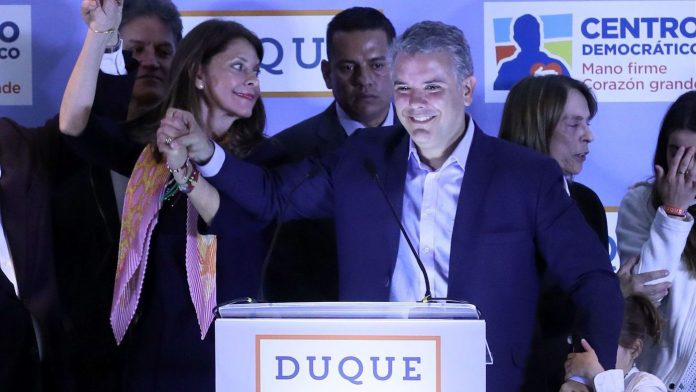First, the good news. Colombia went to the polls last weekend and did so largely peacefully. Not only this but, as should be the case in a democracy, in the run-off in June, voters will have a choice between two distinct visions and programs for the country. Crucially, these different visions do not just extend to how to proceed with the peace process between the government and the FARC rebels with whom the outgoing President Juan Manuel Santos signed a peace deal in 2016 after more than 50 years of conflict, but also differences about social policy, economic policy and, in broader terms, the question of how to address the deep divisions in Colombian society. In other words, at first glance, Colombia looks like a fairly normal democracy.
However, from several other perspectives, the scenario is not quite so rosy and enormous challenges lie ahead, both domestically and regionally.
Let’s look at the peace process first. It is striking, and perhaps Santos’ biggest failure, that, in all the years of the negotiating process and since the eventual approval of the peace deal, society remains deeply divided about the very merits of both the deal and the peace process itself. In other words, Santos has not managed to convince society as a whole of the benefits of the peace process with the FARC. Mistrust, indeed hatred, of the FARC runs deep. That this should be so is no surprise but that so little progress seems to have been made is worrying for the future evolution of the process.
Related, one of the consequences of the peace deal has been a significant shift in the dynamics of organized crime and violence in the country. The demobilization of the FARC has seen some of its former fighters drift into other organized crime networks and, taking advantage of the chaos in neighboring Venezuela, on which more below, has led to the Colombian/Venezuelan border becoming one of the major hubs for organized crime in Latin America. It has also meant that some regions of the country have actually seen an increase in violence since the peace deal which, obviously, does nothing to generate public support for it.
Critically, second-placed candidate Petro, a former guerilla himself, has pointed to the fact that many of the root-causes of the civil conflict – the rampant economic inequality as well as the deep divisions between rural and urban area – both economically and socially – have not been addressed sufficiently or sustainably. The fact that candidates from the broadly defined Left, for the first time in Colombian electoral history, secured just over 50% of the vote, albeit spread across several candidates, suggests that many ordinary Colombians agree and want real political and social, change.
Yet, the flipside is that the elections have also revealed a country which is, essentially, split down the middle, not just on the peace process but on many other things as well. Whoever wins the second round, whether it is Petro or Conservative frontrunner, and ally of former President Uribe who remains highly influential in Colombian politics, Ivan Duque, will preside over a deeply divided country at a time of persistent instability in South America as a whole.
The most obvious source of this instability is the afore-mentioned Venezuela which, isolated and on the brink of total economic collapse, is having a direct impact on Colombia. According to recent estimates, more than one million Venezuelans have fled their country, the majority to Colombia, putting enormous strain on authorities and local communities. Worryingly for Colombia, not only does this situation show no signs of changing any time soon, but any regional efforts to address it in a coordinated regional manner have all but collapsed, especially since the effective suspension of the workings of UNASUR, the Community of South American States, which had on several occasions tried to mediate a negotiated solution to the political crisis in Caracas, albeit unsuccessfully.
This collapse of regional cooperation is also the consequence of a much more generalized ‘inward’ turn of South American governments, engulfed, as many of them are, by their own domestic crises. The most obvious case is Brazil, the country being led by a weak and highly unpopular President who, currently, is struggling to even keep the country functioning, confronted, as he is, by striking lorry drivers, a security crisis in Rio de Janeiro and elsewhere and persistent allegations of corruption against himself and members of his inner circle. As a consequence, Brazil has abandoned any interest in regional cooperation or, indeed, in foreign policy in any coherent or meaningful way. Upcoming Presidential and Congressional elections in October carry the very real risk of a populist surge, with unpredictable consequences for the country and the region as a whole.
Further south, Argentina is passing through one of its periodic economic crises, with extraordinarily high-interest rates and, once again, the presence of the International Monetary Fund in an effort to bring the crisis under control. Colombia’s Andean neighbors, in the meantime, are consumed by their internal battles, such as in the case of Ecuador, where a bitter feud is ongoing between President Lenin and his predecessor Correa, bringing together a toxic mix of personal animosity and strategic disagreements about the direction of the country.
A deeply divided Colombia, therefore, would, on the one hand, follow a regional trend of political polarization whilst, on the other, facing a number of serious practical and strategic problems essentially on its own, with the risk of further fraying the already stretched social fabric of the country.
Interestingly, however, despite this context, Colombia has bucked a regional trend and continued to engage consistently and meaningfully with the world outside Latin America. President Santos has followed up Colombia’s free trade agreement with the European Union, which took effect in 2013, with further initiatives inserting Colombia into the international community, ending his presidency by taking the country both into the OECD, as well as NATO. In light of the internal polarization, the fragility of the peace process and the regional ‘inward turn’ it may well be that the country’s participation in these multilateral forums will give it the pillars of stability needed to see it through this tumultuous period of its history.

Kai Enno Lehmann is an Associate Professor at the Institute of International Relations of the University of São Paulo (IRI-USP) in Brazil, having previously held positions at the Pontifica Universidade Católica, Rio e Janeiro (PUC-Rio) and the University of Liverpool in England, from which he holds a PhD in International Relations. Dr Lehmann’s research focusses on regionalism in Europe, violence and corruption in Latin America, as well as the application of Complexity Theory to crises. He has done several pieces of consultancy work for the German Federal Ministry for Economic Cooperation and Development.


